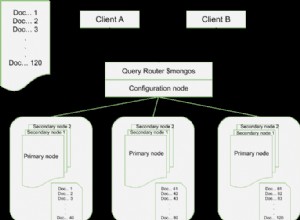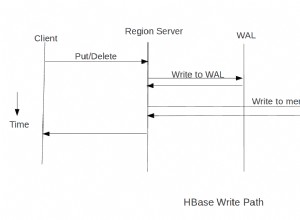Sie möchten einen Streaming-Parser verwenden. Diese ziehen jeweils nur kleine Teile Ihrer Datei in den Speicher.
Es gibt sie in verschiedenen Varianten:SAX-ähnliche Push-Parser und Pull-Parser. XML-Reader-Modelle:SAX versus XML-Pull-Parser gibt einen Überblick über die Unterschiede.
Push-Parser
Dies ist ein kurzes Beispiel mit salsify/json-streaming-parser.
Beim Durchlaufen der Datei behalten wir die summonerId im Auge , championId , und Zustand. Es ist alles ereignisbasiert - Sie erhalten keinen wahlfreien Zugriff mit einem sequentiellen Parser, also müssen Sie selbst den Überblick behalten. Jedes Mal, wenn totalSessionsPlayed erscheint, wird die summonerId ausgegeben , championId , und TotalSessionsPlayed .
data.json
Dies ist eine gepaarte JSON-Datei zu Demonstrationszwecken.
[
{
"_id": "53b29644aafd413977b23b7e",
"summonerId": 24570940,
"region": "euw",
"stats": {
"110": {
"totalSessionsPlayed": 3,
"totalSessionsLost": 2,
"totalSessionsWon": 1
},
"112": {
"totalSessionsPlayed": 45,
"totalSessionsLost": 2,
"totalSessionsWon": 1
}
}
},
{
"_id": "asdfasdfasdf",
"summonerId": 555555,
"region": "euw",
"stats": {
"42": {
"totalSessionsPlayed": 65,
"totalSessionsLost": 2,
"totalSessionsWon": 1
},
"88": {
"totalSessionsPlayed": 99,
"totalSessionsLost": 2,
"totalSessionsWon": 1
}
}
}
]
Beispiel:
class ListMatchUps extends JsonStreamingParser\Listener\IdleListener
{
private $key;
private $summonerId;
private $championId;
private $inStats;
public function start_document()
{
$this->key = null;
$this->summonerId = null;
$this->championId = null;
$this->inStats = false;
}
public function start_object()
{
if ($this->key === 'stats') {
$this->inStats = true;
} else if ($this->inStats) {
$this->championId = $this->key;
}
}
public function end_object()
{
if ($this->championId !== null) {
$this->championId = null;
} else if ($this->inStats) {
$this->inStats = false;
} else {
$this->summonerId = null;
}
}
public function key($key)
{
$this->key = $key;
}
public function value($value)
{
switch ($this->key) {
case 'summonerId':
$this->summonerId = $value;
break;
case 'totalSessionsPlayed':
echo "{$this->summonerId},{$this->championId},$value\n";
break;
}
}
}
$stream = fopen('data.json', 'r');
$listener = new ListMatchUps();
try {
$parser = new JsonStreamingParser_Parser($stream, $listener);
$parser->parse();
} catch (Exception $e) {
fclose($stream);
throw $e;
}
Ausgabe:
24570940,110,3
24570940,112,45
555555,42,65
555555,88,99
Pull-Parser
Dies verwendet einen Parser, den ich kürzlich geschrieben habe, pcrov/jsonreader (erfordert PHP 7.)
Gleiche data.json wie oben.
Beispiel:
use pcrov\JsonReader\JsonReader;
$reader = new JsonReader();
$reader->open("data.json");
while($reader->read("summonerId")) {
$summonerId = $reader->value();
$reader->next("stats");
foreach($reader->value() as $championId => $stats) {
echo "$summonerId, $championId, {$stats['totalSessionsPlayed']}\n";
}
}
$reader->close();
Ausgabe:
24570940, 110, 3
24570940, 112, 45
555555, 42, 65
555555, 88, 99




